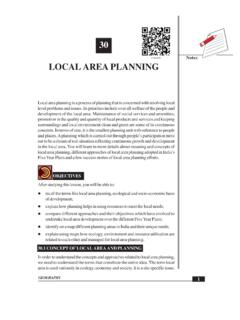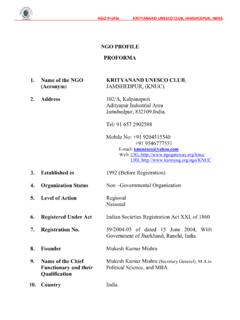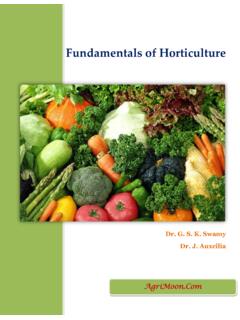Transcription of HORTICULTURE DEVELOPMENT
1 TFYP working group REPORT OF THE working group ON HORTICULTURE DEVELOPMENT (Fruits, Vegetables, Tuber Crops, Floriculture, Medicinal & Aromatic Plants, Spices, plantation Crops including Tea, Coffee and Rubber) FOR THE TENTH FIVE YEAR PLAN (Main Report) GOVERNMENT OF INDIA PLANNING COMMISSION JUNE 2001 PREFACE Over the years, HORTICULTURE has emerged as one of the potential agricultural enterprise in accelerating the growth of economy. Its role in the country's nutritional security, poverty alleviation and employment generation programmes is becoming increasingly important. It offers not only a wide range of options to the farmers for crop diversification, but also provides ample scope for sustaining large number of Agro-industries which generate huge employment opportunities.
2 At present, HORTICULTURE is contributing of GDP from 8% land area. During the previous two Plan periods, focused attention was given to horticultural research and DEVELOPMENT . The result has been encouraging. On account of significant production increases in horticultural crops across the country, a Golden Revolution is in the offing and India has emerged as a leading player in the global scenario. We have now emerged as the world's largest producer of coconut and tea and the second largest producer and exporter of tea, coffee, cashew, spices exports of fresh and processed fruits, vegetables, cut flowers, dried flowers have also been picking up As a result of a number of thoughtful research, technological and policy initiatives and inputs, HORTICULTURE in India, today, has become a sustainable and viable venture for the small and marginal farmers.
3 It is a matter of satisfaction that their food consumption levels and household income have increased. Besides, this sector has also started attracting entrepreneurs for taking up HORTICULTURE as a commercial venture. Therefore, there is a great scope for the HORTICULTURE industry to grow and flourish. The growth of any enterprise on a notional scale pre-supposes sound and responsive infrastructure. During the past several years, we have created commensurate infrastructure facilities for horticultural research, education and DEVELOPMENT in the country in terms of setting up of institutes, National Research Centres, All India Coordinated Research Projects, establishment of separate Departments of Fruits, Vegetables, Floriculture in several State Agricultural Universities and carving out State Departments of HORTICULTURE from the erstwhile Agriculture Departments in many of the States.
4 About 10 per cent of the total budget of Indian Council of Agricultural Research (ICAR) and 17 per cent of the total budget of the Department of Agriculture & Cooperation (DAC) has been earmarked for the HORTICULTURE sector during the IX Plan. There is no doubt that the tempo generated during the IX Plan will be accelerated, during the next plan and to meet the aspirations of the farmers of the country besides providing the needed nutritional security to the Indian population. The planning process for the DEVELOPMENT of HORTICULTURE during the X Plan has commenced with the constitution of the working group on HORTICULTURE DEVELOPMENT covering fruits, vegetables, potato, tropical tubercrops, mushroom, floriculture, medicinal & aromatic plants, plantation crops and spices.
5 To ensure greater participation of various departments of Government of India, State Govts and other public and private institutes and individual farmers, 13 Sub-Groups were constituted, each with about 10 members with outstanding and experienced individuals in various fields both from within and out of the working group . While 7 groups were devoted to various horticultural crops, the remaining 6 were devoted to related issues concerned with production & export. This report is the outcome of the deliberations of the working group , which held four meetings, besides the reports submitted by 13 Sub-Groups. The report has been divided into 17 Chapters covering various commodities and sectors of HORTICULTURE .
6 Efforts have been made to highlight the current status of HORTICULTURE industry in terms of area , production productivity & exports, future demand, infrastructure available for the same, constraints, progress during the Ninth Plan, opportunities and strategies to achieve objectives, organisational and infrastructure support besides drawing programmes for the X Plan. The emerging trends in deployment of hi-tech HORTICULTURE have also been discussed in detail. An attempt has been made to provide recommendations, which could result into action programmes for accelerating the growth of the HORTICULTURE sector. The report of the Sub-Groups has been given separately in Volume II.
7 The task assigned has been a challenging one, the accomplishment of which would not have been possible without the cooperation and support of many. I take this opportunity to place on record my thanks to all the members of the working group for their active participation in the deliberations and for providing necessary guidance and inputs for drawing the recommendations. I also express my sincere thanks to the Chairmen and Member Secretaries of all the 13 Sub-Groups for their valuable inputs. I also take this opportunity to thank the Members of various Sub-Groups for their participation and contribution in the finalization of the detailed Sub- group report. My special thanks are due to , HORTICULTURE Commissioner, Govt.
8 Of India, who as a Member Secretary,for chairing two Sub- group , providing the logistic support for organising the meetings and finalising the report. Thanks are also due to Shri , Executive Director, National HORTICULTURE Board and his staff for providing facilities for holding two meetings of the working group at their premises at Gurgaon. I shall also like to record my thanks to Shri Kanade, Director Agriculture, Planning Commission for participation in all the meetings and sharing his views on the X Plan formulations. The assistance and support rendered by Dr. P. Rethinam, Chairman, Coconut DEVELOPMENT Board, in finalising the report of the working group is gratefully acknowledged.
9 I am highly thankful to Dr. Jose C. Samuel, Additional Commissioner ( HORTICULTURE ), New Delhi, Dr. K. Sivaraman, Director, Directorate of Arecanut and Spices, Smt. Remany Gopalakrishnan, Deputy Director, Coconut DEVELOPMENT Board, Shri P. K. Thampan, retired Chief Coconut DEVELOPMENT Officer, Coconut DEVELOPMENT Board, Kochi for their unstinted help in compiling and finalising this report. I am thankful to Shri Srivastava IAS, Secretary ,Department of Agriculture & Cooperation (DAC) and Shri Hemendra Kumar IAS, Special Secretary, (DAC) for extending help in terms of the Officers and Staff of HORTICULTURE Division, DAC. I, personally, feel honoured and thankful to the Planning Commission for giving me the opportunity to head the working group on HORTICULTURE DEVELOPMENT .
10 The Terms of Reference drawn by the Planning Commission is worthy of appreciation, which has been the guiding principle for the working group . I hope this report would prove to be a useful document for finalising the strategies and programmes for the holistic DEVELOPMENT of HORTICULTURE in the country during the Tenth Plan and will usher in an era of nutritional sufficiency and prosperity among the populace of the country. Dated 30th June, 2001 (Dr. Chadha) Chairman working group on HORTICULTURE And plantation Crops CONTENTS CH. NO. TOPIC PAGE NO. PREFACE i CONTENTS v LIST OF ANNEXURES xx LIST OF TABLES xxiii LIST OF FIGURES xxv EXECUTIVE SUMMARY xxvi I INTRODUCTION 1 1.















